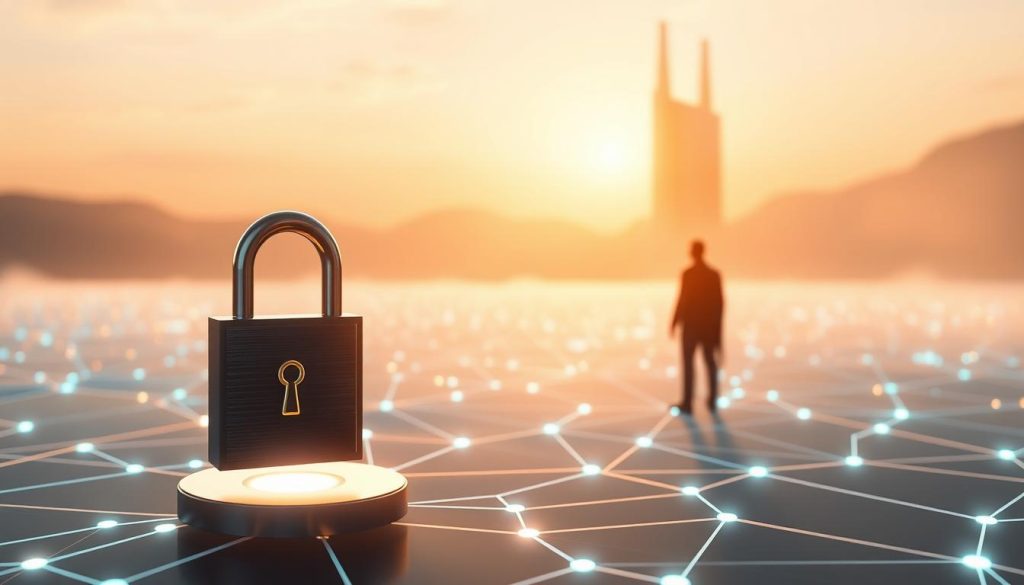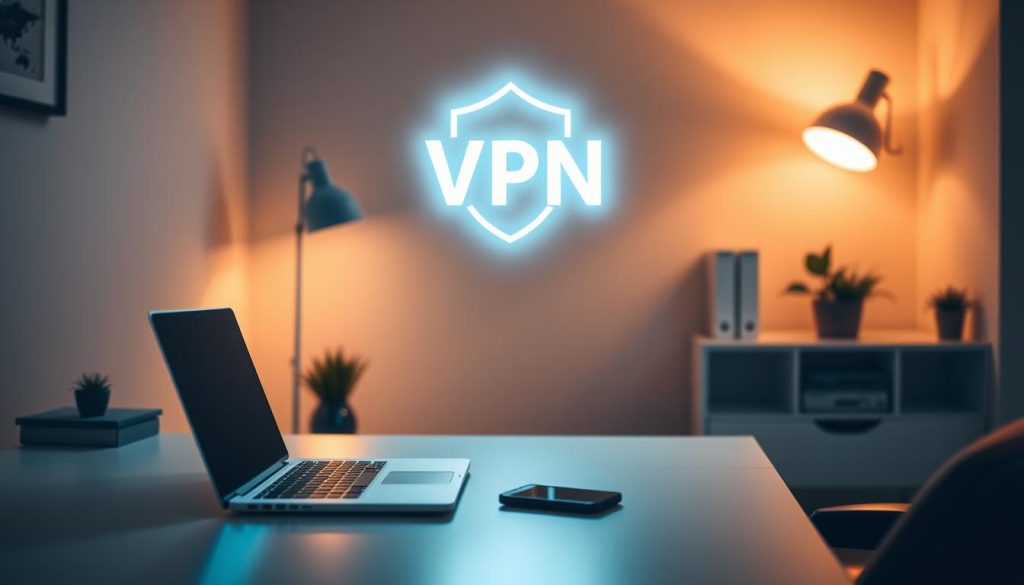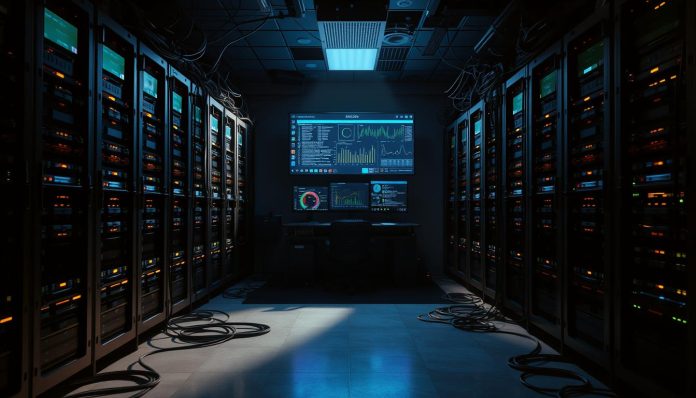Online privacy is a big concern, and the threat is closer than you might think. People often worry about Big Tech companies like Google tracking them. But, a more personal danger is your own internet connection at home.
Your online activities can be watched through router logs and ISP monitoring. This raises big worries about data privacy. Knowing about these dangers is the first step to protect your digital life.
Key Takeaways
- Router logs can reveal your browsing history and online activities.
- ISPs can monitor your internet usage and collect personal data.
- Understanding these threats is crucial for protecting your online privacy.
- There are steps you can take to minimize the risk of being monitored.
- Enhancing your network security can help safeguard your data.
The Reality of Digital Footprints in Your Home Network
Your home network isn’t as private as you might think. Your router logs all your online activities. This is key to understanding internet usage monitoring in your home.
How Your Online Activities Are Tracked
When you use your home Wi-Fi, your router tracks every site you visit. This info is stored in the router’s logs. You can access this by logging into your router. Network traffic analysis helps manage data flow but also tracks your online activities.
Your router logs websites you visit, how long you’re online, and which devices you use. This lack of online privacy protection leaves your digital footprint open.
The Growing Concerns About Digital Privacy
More people are worried about digital privacy as data collection grows. They’re realizing their online activities aren’t as private as they thought. The data your ISP collects and stores can be used in many ways, raising big privacy concerns.
The need for online privacy protection is urgent. With more digital data being collected, knowing how to protect your privacy is essential. It’s important to understand how your data is collected, stored, and shared.
Understanding Router Logs and Their Purpose
Router logs are more than just records; they are a window into your network’s activity. These logs are key for managing your home network’s network security. They help you understand the data flowing through your router.
Router logs hold a lot of information. They show which devices have connected to your network, when, and how much data they’ve sent. They also log changes to your router settings, attempts to access blocked sites, and network errors. This info is vital for fixing problems and keeping your network safe.
What Router Logs Actually Contain
Router logs detail the devices on your network, like their IP addresses and connection times. They might also track websites visited, depending on your router’s setup. Knowing what your router logs include helps you manage your data privacy better.
https://www.youtube.com/watch?v=V6q3wsh5xAw
How Long Router Logs Are Typically Stored
The time router logs are kept varies by router model and settings. Some keep logs for days, while others store them for months. It’s important to check your router’s settings to see how long it keeps logs.
Why Routers Keep These Records
Routers log activity to aid in network management and security. These logs help spot security threats, fix connectivity issues, and monitor network performance. Understanding router logs helps you boost your network’s security and protect your data privacy.
Effective management of router logs can enhance your network’s security and privacy. Regularly checking your router logs can help catch suspicious activity. This lets you take steps to secure your network.
The Extent of ISP Monitoring Capabilities
How much your ISP can watch your online activities is complex. It depends on laws and their tech skills. ISPs gather data for many reasons, like following data retention laws, censoring content, and selling info to marketers.
Legal Framework for ISP Data Collection in the US
In the US, laws about ISP data collection are many. The Patriot Act and the Communications Assistance for Law Enforcement Act (CALEA) are key. These laws make ISPs keep certain data for a while. This lets police get this data under certain rules.
ISPs also have to report things like copyright infringement. The Digital Millennium Copyright Act (DMCA) is a rule that affects how ISPs handle user data.
Technical Methods ISPs Use to Monitor Traffic
ISPs use different ways to watch internet traffic. One way is packet sniffing. This means looking at data packets on the internet. But, there are laws that limit this.
Another method is Deep Packet Inspection (DPI). It’s like packet sniffing but looks deeper. DPI can manage internet traffic but also worries privacy experts.
Deep Packet Inspection and Its Implications
DPI is a strong tool for ISPs to watch internet traffic closely. But, it’s a big deal for privacy. By looking at data packets, ISPs can see what users do online. This could be a privacy problem.
| Method | Description | Privacy Impact |
|---|---|---|
| Packet Sniffing | Analyzing data packets transmitted over the internet | Moderate |
| Deep Packet Inspection (DPI) | Advanced packet sniffing that examines packet content thoroughly | High |
Types of Data Your ISP Can Access
Your ISP can see many things about your internet use. This is something to think about when you’re online. They can log different types of data related to what you do online.
Browsing History and Website Visits
Your ISP knows what websites you visit. This tells them a lot about you, like your interests and habits. For example, if you look at health sites, they might guess you’re interested in health.
Download and Upload Activities
They also watch what you download and upload. This could be documents, pictures, or videos. They can see where these files come from and where they go, which might show who you’re talking to online.
Connection Times and Duration
ISPs track when and how long you’re online. This helps them understand your online habits. They can see when you’re most active and how long you stay online.
Device Information and Identifiers
When you go online, your devices share info with your ISP. This includes what kind of device you have and its unique ID. This helps ISPs manage their network but also raises privacy questions.

| Type of Data | Description | Privacy Implication |
|---|---|---|
| Browsing History | Records of websites visited | Reveals personal interests and habits |
| Download/Upload Activities | Files transferred over the internet | Exposes the type of content accessed or shared |
| Connection Times/Duration | Timing and length of internet sessions | Indicates daily routines and online behavior patterns |
| Device Information | Details about devices used to connect to the internet | Can be used to identify and track devices |
Knowing what your ISP can see is key to keeping your online privacy. By understanding what data is collected, you can protect your information and keep your online activities private.
Router Logs & ISP Monitoring: What They Can See & What You Can Do
Understanding how router logs and ISP monitoring affect your online security is key. Your online actions are tracked and recorded by your router and Internet Service Provider (ISP). This raises big privacy concerns.
The Relationship Between Router Logs and ISP Monitoring
Router logs and ISP monitoring are linked to your online life. Your router logs devices, data, and access attempts. Meanwhile, your ISP watches your internet use, like websites and data transfers. Knowing this helps protect your online privacy.
Using a VPN (Virtual Private Network) encrypts your internet. This makes your online activities invisible to your router and ISP. It adds a big privacy and security boost to your online life.
Common Misconceptions About Privacy
Many think private browsing modes or clearing history keeps them private. But, your router and ISP can still see what you do online, even with these steps.
To really protect your privacy, you need to know these methods’ limits. Use a VPN, set up your router for privacy, and be careful with what you share online. These actions greatly improve your privacy and security in today’s digital world.
Privacy Implications of ISP Data Collection
ISP data collection affects your online privacy. Your internet service provider (ISP) can monitor your online activities. This includes the websites you visit and the data you share.
How Your Data Might Be Used by ISPs
ISPs use your data for targeted advertising and data analytics. They analyze your browsing habits to create detailed profiles. This helps them deliver personalized ads.
ISPs might also monetize your data by selling it to marketing companies. This practice is a growing concern. It invades your privacy and puts your personal data at risk.
Potential Third-Party Access to Your Information
Third parties, like government agencies and law enforcement, can access your ISP data. In some cases, ISPs must provide user data to these entities. This can happen without your consent.
| Entity | Potential Use of Data |
|---|---|
| Marketing Companies | Targeted Advertising |
| Government Agencies | Surveillance, Law Enforcement |
| Law Enforcement | Investigations, Prosecution |
The Value of Your Browsing Data in the Market
Your browsing data is highly valuable. It helps create detailed profiles of your online behavior. Advertisers and marketers seek this information to tailor their campaigns.

Understanding ISP data collection is key to protecting your online identity. Knowing how your data is collected and used helps you safeguard your privacy.
Accessing and Interpreting Your Router Logs
To keep your network safe, you need to know how to get into and understand your router logs. Router logs are key for managing your network. They show you what’s happening with your network, any security threats, and how well your system is working. By looking at these logs, you can learn more about your network’s activity and spot any security risks.
Step-by-Step Guide to Accessing Router Logs
To get into your router logs, first log into your router’s web interface. You’ll need your admin login details. Just open a web browser, go to your router’s IP address (usually 192.168.0.1 or 192.168.1.1), and enter your username and password.
Common Router Admin Interfaces
Most routers have a web interface for setting up, monitoring, and checking logs. The look of this interface can change based on your router and its software. Brands like Netgear, TP-Link, and Asus make their interfaces easy to use.
Security Considerations When Accessing Logs
When you’re looking at your router logs, make sure your connection is safe. Use a secure browser and try to access the logs from a device plugged directly into the router. This helps protect you from threats. Also, keep your admin login details strong and unique to avoid unauthorized access.
Deciphering Common Log Entries and Codes
Router logs have many entries that might seem confusing at first. But, knowing what they mean is important for understanding your network and spotting security risks. You’ll see entries about connection attempts, data transfers, and errors. For example, if you see lots of failed login tries, it might be a sign of a brute-force attack. Or, if there are strange data transfer patterns, it could mean a device on your network is compromised.
| Log Entry Type | Description | Potential Issue |
|---|---|---|
| Connection Attempt | Record of a device trying to connect to the network | Unauthorized access attempt |
| Data Transfer | Details of data sent and received by devices on the network | Unusual patterns may indicate malware or data theft |
| Error Message | Notification of issues such as failed connections or configuration errors | May indicate a configuration problem or hardware failure |
By understanding and analyzing your router logs, you can make your network safer and keep it running well. Checking these logs often can help you catch and fix problems before they get worse.
Using VPNs to Protect Your Online Privacy
Virtual Private Networks (VPNs) are key in keeping your online activities safe. They encrypt your internet traffic, hiding it from your router and ISP. This keeps your online actions private, even on public Wi-Fi.
How VPNs Shield Your Browsing from ISPs
VPNs create an encrypted tunnel for your internet traffic. This makes it hard for your ISP to see what you’re doing online. VPNs keep your browsing private and secure.

Selecting a Reliable VPN Service
Finding a good VPN service is important for online privacy. Here are some things to think about:
Key Features to Look For
- Strong Encryption: Make sure the VPN uses strong encryption to protect your data.
- No-Logs Policy: Choose a VPN that doesn’t log your activities.
- Multiple Server Locations: A VPN with many server locations lets you access more content.
Red Flags to Avoid
- Slow Connection Speeds: Stay away from VPNs that slow down your internet.
- Poor Customer Reviews: Check reviews to make sure the VPN is reliable.
- Lack of Transparency: Avoid VPNs that don’t clearly explain their logging and encryption.
Setting Up a VPN on Different Devices
It’s important to set up a VPN on all your devices. Most VPNs have apps for Windows, macOS, Android, and iOS. Setting up a VPN on your devices keeps your internet safe everywhere.
Make sure your VPN connects automatically when you’re on public Wi-Fi. This extra step helps protect your data from threats.
Implementing HTTPS and Encrypted Connections
Protecting your online activities is key. Understanding HTTPS and encrypted connections is crucial. HTTPS encrypts your browser traffic, making it hard for ISPs and routers to watch your activities.
The Importance of HTTPS for Privacy
HTTPS, or Hypertext Transfer Protocol Secure, ensures your data is sent securely. It keeps your online communications safe from third parties, like ISPs. This is vital for keeping your personal info safe.
Key benefits of HTTPS include:
- Encryption of data in transit
- Authentication of websites
- Protection against eavesdropping and tampering
Browser Extensions for Enforcing HTTPS
Browser extensions can boost your online privacy. Tools like HTTPS Everywhere make sure your connection is secure. This helps protect you from surveillance.
| Browser Extension | Description | Compatibility |
|---|---|---|
| HTTPS Everywhere | Automatically enables HTTPS for supported sites | Chrome, Firefox, Edge |
| Privacy Badger | Blocks trackers and enforces HTTPS | Chrome, Firefox |
Verifying Secure Connections
To make sure you’re using HTTPS, check the website’s URL. Look for “https://” and a padlock icon in your browser. These signs mean the connection is secure. Be careful with sites without these, as they might not protect your data.
Using HTTPS and encrypted connections is a big step for online privacy. It’s a simple yet powerful way to stay safe online.
Alternative DNS Services for Enhanced Privacy
Looking for online privacy? Alternative DNS services are key. DNS, or Domain Name System, is like the internet’s phonebook. It turns domain names into IP addresses computers can get. But, your ISP’s DNS might not keep your privacy safe.
How DNS Requests Can Reveal Your Browsing Habits
When you go to a website, your device sends a DNS request. This request shows what sites you visit and what content you see. Using a privacy-focused DNS service can hide your browsing habits from your ISP or others.
Configuring Privacy-Focused DNS Services
Choosing a privacy-focused DNS service boosts your online privacy. Here’s how to do it:
Popular Privacy DNS Options
Cloudflare DNS, Google Public DNS, and Quad9 are top choices. They offer better security and privacy than ISP DNS services.
Implementation Steps
To use a privacy-focused DNS service, change your DNS settings. Here’s how:
- Choose a DNS service and get its server addresses.
- Go to your device or router’s network settings.
- Change the DNS server addresses to the ones from your chosen service.
- Save and restart your device or router.
| DNS Service | Primary DNS | Secondary DNS |
|---|---|---|
| Cloudflare DNS | 1.1.1.1 | 1.0.0.1 |
| Google Public DNS | 8.8.8.8 | 8.8.4.4 |
| Quad9 | 9.9.9.9 | 149.112.112.112 |
Switching to a privacy-focused DNS service boosts your online privacy and security. It’s a simple way to keep your browsing habits private.
Router Settings to Enhance Privacy and Security
Setting up your router right is key to keeping your online life safe. Your router is the heart of your home network. It’s where your data and devices get protected from unwanted eyes.
Disabling Unnecessary Logging Features
First off, turn off any logging you don’t need. Router logs can share details about your online life. Turning off logging helps keep this info safe from prying eyes.
To do this, go to your router’s control panel. You can find it by typing its IP address in a browser. Look for logging settings and turn them off. Save your changes to make sure logging is off.
Updating Firmware and Security Settings
It’s important to keep your router’s software up to date. Updates fix security holes that hackers might use. Check for updates in your router’s settings and apply them quickly.
Also, check your router’s security settings. Make sure you’re using the latest security, like WPA3. And turn off remote management unless you really need it.
Setting Up Guest Networks for Added Security
Creating a guest network is a smart move for security. It keeps visitors separate from your main network. Guest networks limit what visitors can see and do. To set one up, go to your router’s settings and find the wireless section. Set up the guest network with a password and limit access.
With these changes, you’ll make your network much safer. And you’ll keep your online life private.
The Tor Network and Other Advanced Privacy Tools
The Tor network is a strong tool for digital anonymity. As online privacy worries grow, people seek out advanced tools. These tools help keep their identity and browsing habits safe.
Understanding How Tor Protects Your Privacy
The Tor network keeps your online activities private. It does this by sending your internet traffic through many servers. This adds lots of encryption to your data.
This process, called onion routing, makes it hard to trace your online activities back to your IP address.
Key Features of Tor:
- Multi-layered encryption
- Decentralized network
- Anonymity through traffic routing

Limitations and Considerations When Using Tor
While Tor offers great privacy, it has its downsides. You might find your internet speeds slower because of the complex routing. Also, Tor can’t block all tracking and surveillance.
| Limitation | Description |
|---|---|
| Speed | Internet speeds may be slower due to routing complexity |
| Security | Not entirely immune to sophisticated tracking methods |
| Ease of Use | May require technical knowledge to configure and use effectively |
Additional Privacy-Enhancing Software
There are other tools to boost online privacy, besides Tor. These include VPNs, privacy-focused browsers, and encrypted messaging apps. Each tool has its own benefits and can work well with Tor for better protection.
Combining Tools for Enhanced Privacy: Mixing different privacy tools can offer a stronger defense against privacy threats. For example, using a VPN with Tor adds more encryption and security.
Conclusion
Understanding Router Logs & ISP Monitoring is key to keeping your online activities private. Your internet use can be tracked through router logs and ISP monitoring. This shows why strong network security is important.
To protect your online privacy, use a mix of strategies. VPNs can hide your browsing from ISPs. HTTPS connections keep your data safe by encrypting it. Also, using alternative DNS services can make your DNS requests less visible.
By managing your online privacy, you lower the chance of your personal info being used without your consent. Keep up with the latest in online privacy and check your digital footprint often. This helps keep your online presence safe.

